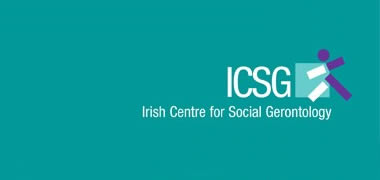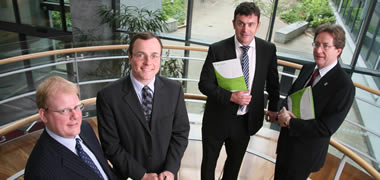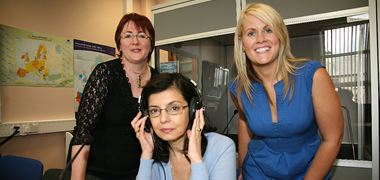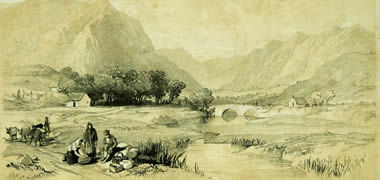-
Courses

Courses
Choosing a course is one of the most important decisions you'll ever make! View our courses and see what our students and lecturers have to say about the courses you are interested in at the links below.
-
University Life

University Life
Each year more than 4,000 choose University of Galway as their University of choice. Find out what life at University of Galway is all about here.
-
About University of Galway

About University of Galway
Since 1845, University of Galway has been sharing the highest quality teaching and research with Ireland and the world. Find out what makes our University so special – from our distinguished history to the latest news and campus developments.
-
Colleges & Schools

Colleges & Schools
University of Galway has earned international recognition as a research-led university with a commitment to top quality teaching across a range of key areas of expertise.
-
Research & Innovation

Research & Innovation
University of Galway’s vibrant research community take on some of the most pressing challenges of our times.
-
Business & Industry

Guiding Breakthrough Research at University of Galway
We explore and facilitate commercial opportunities for the research community at University of Galway, as well as facilitating industry partnership.
-
Alumni & Friends

Alumni & Friends
There are 128,000 University of Galway alumni worldwide. Stay connected to your alumni community! Join our social networks and update your details online.
-
Community Engagement

Community Engagement
At University of Galway, we believe that the best learning takes place when you apply what you learn in a real world context. That's why many of our courses include work placements or community projects.
2009
All 2009
Irish Centre for Social Gerontology Leads Cross-border Research Network on Rural

Tuesday, 7 July 2009
NUI Galway has been announced among the recipients of the Research Grants Programme by the Centre for Ageing Research and Development (CARDI). The CARDI programme aims to promote north-south research partnerships that bring together different subject areas to look at issues affecting older people in new ways. The research will involve older people themselves and the findings will be designed to improve policies and services for them. The Irish Centre for Social Gerontology at NUI Galway, with Queen's University Belfast, the School of Geography at NUI Galway, Rural Community Network and FORUM will establish a cross-border research network to explore healthy ageing in rural communities. The network, entitled Healthy Ageing in Rural Communities (HARC), will draw on interdisciplinary expertise in the areas of gerontology, economics, spatial planning, rural geography, social care and public health. Professor Bob Stout, Queen's University Belfast, Co-chair of the grants panel, said: "CARDI's wish is to get all the partners together and stimulate research that will bring benefits to the daily lives of older people". The Healthy Ageing in Rural Communities research network will commence in September 2009 and will run to the following year. Speaking about the grant award, Kieran Walsh, Research Officer at the Irish Centre for Social Gerontology, NUI Galway, said: "Although there is an over representation of older people in rural areas throughout Ireland, research into rural ageing has been limited to small-scale studies with a total absence of any cross-border coordination. HARC will allow us to share existing knowledge, identify key research questions for future study, and ultimately increase the capacity for rural ageing research in the fields of ageing and rurality across Ireland". HARC is a part of a broader research programme on rural ageing at the Irish Centre for Social Gerontology. Focussing on the economics of ageing, technology and ageing, and rural ageing, the multidisciplinary research centre has been awarded more than €5 million in funding since its establishment in 2006. -ends-
>> Read full story about Irish Centre for Social Gerontology Leads Cross-border Research Network on Rural
Experimentation and Innovating Management Models Key to Survival

Friday, 3 July 2009
"Investment in innovation is your lifeblood, so it should be cut only as a last resort. The evidence from past recessions is that many highly successful innovations came when the recession was at its worst. Necessity is the mother of invention". This was the message from international thought leader on international management and strategy, Professor Julian Birkinshaw, who spoke at the recent InterTradeIreland Innovation conference hosted by the Centre of Innovation and Structural Change (CISC) at NUI Galway. Professor Birkinshaw is co-founder and research director of the Management Lab (M-Lab), a non-profit organisation based in California working to accelerate management innovation, and Professor of Strategic and International Management at London Business School. During a presentation called 'Innovating your Management Model: Developing New and Better Ways of Working', Professor Birkinshaw argued that the current economic crisis was a failure of management. He said the current model of management is flawed through an over emphasis on the role of leader and not the managers within firms. New ideas are emerging about how management is changing and he commented that "to survive and prosper firms need to innovate their current management models to sustain their competitive momentum". The 164 delegates at the conference heard that innovation is not limited to introducing new technologies but that companies should also focus on business and management model innovation. These forms of innovation, he argued, have the highest impact on competitiveness particularly as they are difficult to imitate since they are specific and unique to individual companies. Summing up his three basic rules to approaching innovation in the current climate, Professor Birkinshaw said: "First, innovation applies to how you work as well as to the products you make, and new or better ways of working can actually save you money. Second, make more use of partners as a source of new ideas. Third, become more experimental about what you do – see what works, learn from your mistakes and only scale up when you are confident of success". InterTradeIreland Strategy & Policy Director Aidan Gough said: "This conference explored the challenge of delivering innovation for the smart economy. Innovation is more important than ever in the current climate and can make the difference between mere survival and growth. Professor Birkinshaw provided insights into how embedding innovation into the overall management process can drive success". Professor Birkinshaw's lectures at NUI Galway were part of the InterTradeIreland All-Island Innovation Programme. The Programme, a partnership between InterTradeIreland, NUI Galway, University College Dublin and Queens University Belfast, aims to promote and encourage innovation across the island of Ireland. The All-Island Innovation Programme is complemented by a Community of Researchers working on innovation across the island. -ends-
>> Read full story about Experimentation and Innovating Management Models Key to Survival
Historic Visit by EU Commissioner Kuneva to Acadamh na hOllscolaíochta Gaeilge's

Monday, 31 August 2009
(Leagan Gaeilge) The EU Commissioner for Consumer Affairs, Meglena Kuneva, visited Acadamh na hOllscolaíochta Gaeilge's (NUI Galway) Centre in An Cheathrú Rua on Friday, 28 August. "This is the first such visit by an EU Commissioner to a university centre in the Gaeltacht", said Treasa Uí Lorcáin, Administrator of NUI Galway's Centre in An Cheathrú Rua, "and is a great honour for us to host a visitor as distinguished as Commissioner Kuneva. It reiterates again the deep interest at the highest levels of the European Union in the pioneering work undertaken by Acadamh na hOllscolaíochta Gaeilge in the fields of Interpreting and Translation Studies, especially in light of the employment opportunities now available to graduates of our courses in the European institutions." Commissioner Kuneva visited the facilities in place in the Centre for students and staff, and paid particular attention to the specialist equipment and facilities for the M.A. san Ateangaireacht Chomhdhála (M.A. in Conference Interpreting) and Ard-Dioplóma i Léann an Aistriúcháin (Higher Diploma in Translation Studies) programmes – the leading programmes in these fields in Ireland. New intakes of students will commence their studies in these two programmes in mid-September. Applications for places on the programmes will be accepted until Monday, 7, September. Further information available at www.acadamh.ie/cursai Cuairt Stairiúil ag an gCoimisinéir Eorpach Kuneva ar Acadamh na hOllscolaíochta Gaeilge, an Cheathrú Rua (View in English) Thug Meglena Kuneva, Coimisinéir an Aontais Eorpaigh ar Ghnóthaí Tomhaltais, cuairt ar Acadamh na hOllscolaíochta Gaeilge, Ollscoil na hÉireann, Gaillimh ar an gCeathrú Rua, Dé hAoine, 28 Lúnasa. "Is é seo an chéad uair a thug Coimisinéir de chuid an Aontais Eorpaigh cuairt ar ionad ollscoile sa Ghaeltacht," a dúirt Treasa Uí Lorcáin, Riarthóir Ionad an Acadaimh ar an gCeathrú Rua, "agus is mór an onóir don Acadamh agus don Ollscoil go bhfuil oifigeach chomh sinsearach leis an gCoimisinéir Kuneva ag tabhairt cuairte orainn. Léiríonn sé arís an spéis dháiríre, ag an leibhéal is airde san Aontas Eorpach, san obair cheannródaíoch atá ar bun ag an Acadamh anseo ó thaobh cúrsaí léinn san Aistriúchán agus san Ateangaireacht a chur ar fáil atá dírithe ar na deiseanna maithe fostaíochta sa Ghaeilge a bhíonn á dtairiscint san Aontas Eorpach anois". Thug an Coimisinéir Kuneva cuairt ar áiseanna éagsúla an Ionaid ar an gCeathrú Rua, agus bhí aird ar leith aici ar na háiseanna speisialtóireachta atá ag an Acadamh don M.A. san Ateangaireacht Chomhdhála agus don Ard-Dioplóma i Léann an Aistriúcháin – cláir léinn cheannródaíocha i réimsí na hAteangaireachta agus an Aistriúcháin sa tír seo. Beidh tús á chur i lár na míosa seo chugainn le babhta nua den M.A. san Ateangaireacht Chomhdhála agus den Ard-Dioplóma i Léann an Aistriúcháin. Glacfar le hiarratais le haghaidh na gcúrsaí sin go dtí an 7 Meán Fómhair 2009. Tuilleadh eolais: www.acadamh.ie/cursai -Críoch-
>> Read full story about Historic Visit by EU Commissioner Kuneva to Acadamh na hOllscolaíochta Gaeilge's
Galway Homes Required for Air Pollution Project

Monday, 31 August 2009
NUI Galway, in partnership with the Institute of Occupational Medicine in Edinburgh and the University of Aberdeen, are looking to recruit 50 homes in Galway and 50 in Scotland to participate in a study to measure the levels of indoor air pollutions in homes. The Indoor Air Pollution and Health (IAPAH) project, which will run until December 2010, is funded by the Environmental Protection Agency, and will focus on homes which use solid fuels for heating or cooking, or homes which have a resident smoker. The information collected in this project will be used to estimate how air pollution in homes affects our health. This is one of the first studies in Ireland and Scotland to look at air pollutants in domestic dwellings. Over the last few decades there have been many advances in the design and construction of domestic dwellings. As a result, the amount of air movement in today's buildings is estimated to be 10 times lower than it was 30 years ago. Activities in the home such as cooking, heating and smoking, along with reduced air exchange can result in indoor air pollutants reaching levels greater than those found outdoors. According to Dr Marie Coggins of the School of Physics at NUI Galway and co-ordinator of the project: "The average European spends 90% of their time indoors so the quality of the air we breathe plays a significant role in our health and well-being. Indoor air pollution has been identified as one of the key factors related to the development of respiratory illnesses, such as asthma and allergies. This project will allow us gather information which will help us improve our understanding of this important area". For details on how to participate in the study or for more information on air pollution please visit www.nuigalway.ie/iapah. -ends-
>> Read full story about Galway Homes Required for Air Pollution Project
'Ireland Illustrated' Project to Create Database of Travel Images from the 16th-

Monday, 24 August 2009
The creation of an extensive database of illustrated travel accounts about Ireland, from the 16th-19th century, is underway at NUI Galway. The 'Ireland Illustrated' project will provide an online collection of images showing how Ireland was portrayed in centuries gone by to travellers around the world. NUI Galway's Professor Jane Conroy is one of the team heading up the project: "Travel accounts played a major role in shaping mental images in early modern and modern Europe. Particularly when images came to support the text, the suggested representation might become even truer than reality. These ancient texts and the images they contain preserved an important part of history that needs to be discovered. Bringing this part of our heritage together through the Ireland Illustrated project, we will have a resource of interest and value to all". Large numbers of images and other documents will be scanned and catalogued, including those housed in libraries and museums around the country. Researchers at NUI Galway are asking anyone with books containing images about travelling to Ireland from 1500-1900 to contact them so that copies might be included. The searchable database of travel images will be available for academic use, and for the wider public. Due for completion in 2012, the Ireland Illustrated project will give international audiences access to rare books and give Irish people a way to connect with their visual heritage. Through an interactive searchable map, visitors will also be able to search for images of their own town or county. Professor Conroy, who is also Humanities Secretary with the Royal Irish Academy, adds: "In a way, travel accounts were the Lonely Planet or Rough Guide of their day, often containing drawings or sketches of the scenery and people. Quite scarce in the 1600s, accounts from that century portrayed a wild land, with quite an uncivilised population. From the late 1700s on, manor houses, estates and towns attracted more attention and a different image of Ireland began to filter through". Experts from the world of travel literature, digital humanities and libraries from across Europe gathered at NUI Galway recently to discuss the project. A similar database has been created by the University of Paris-Sorbonne containing travel accounts on France from the same period. The project Texts, Transmission and Cultural Exchange is taking place at NUI Galway Moore Institute for Humanities and is part of an interdisciplinary PhD research programme involving NUI Galway, TCD and UCC, and is funded by PRTLI4 and the Andrew Mellon Foundation. -ends-
>> Read full story about 'Ireland Illustrated' Project to Create Database of Travel Images from the 16th-















